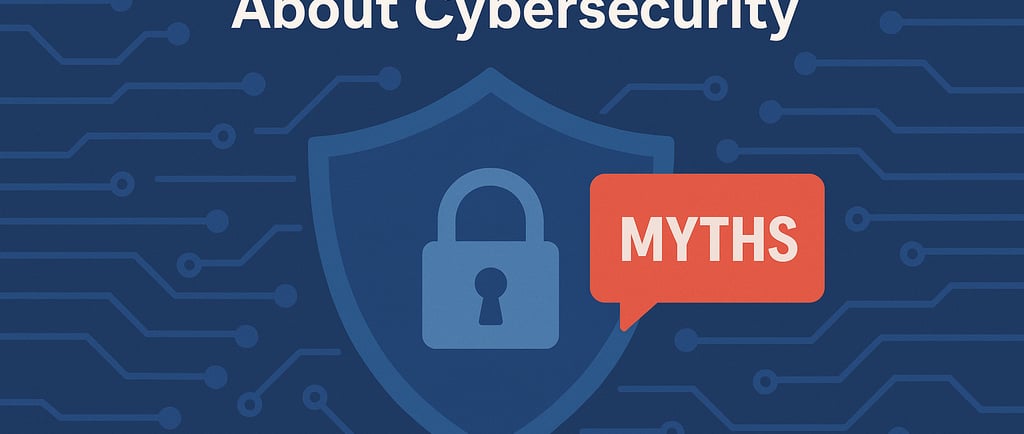Cyber One Information Technology "Your IT Partner For Growth and Success" Call 407-394-1000 to schedule a FREE BUSINESS EVALUATION
Ten Most Common Myths About Cybersecurity
**Ten Most Common Myths About Cybersecurity**
By Richard Medina, Ethical Hacker
6/24/20252 min read


Ten Most Common Myths About Cybersecurity
Cybersecurity is no longer just a concern for large enterprises or tech companies—it’s essential for every organization, especially small and mid-sized businesses (SMBs). Yet, despite rising awareness, many dangerous myths about cybersecurity still persist. These misconceptions can leave businesses vulnerable to breaches, downtime, and data loss.
Let’s debunk the ten most common cybersecurity myths and set the record straight.
1. “We’re Too Small to Be a Target”
Many small businesses believe they’re not on the radar of cybercriminals. In reality, 43% of cyberattacks target small businesses. Why? Because attackers know smaller organizations often lack the advanced defenses of larger firms, making them easy prey.
2. “Antivirus Software Is Enough”
Traditional antivirus tools alone are no longer sufficient. Modern threats like ransomware, fileless attacks, and phishing campaigns require a multi-layered approach, including Endpoint Detection and Response (EDR), firewalls, email filtering, and human training.
3. “Strong Passwords Are All We Need”
Strong passwords are a good start—but not enough. Even complex passwords can be stolen. Implementing Multi-Factor Authentication (MFA) is one of the most effective ways to prevent unauthorized access.
4. “Cybersecurity Is Just the IT Department’s Job”
Security is a company-wide responsibility. Human error causes nearly 90% of breaches, and everyone from front desk staff to executives can be targeted. Regular training and a culture of security awareness are critical.
5. “We’ve Never Had a Breach, So We’re Secure”
Past performance doesn’t predict future safety. Many breaches go undetected for months. A lack of incidents could simply mean a lack of monitoring, not security. Proactive measures are essential.
6. “Cloud Services Are Inherently Secure”
Cloud providers offer secure infrastructure, but security within the cloud is a shared responsibility. Misconfigured settings, poor access control, and unsecured apps can lead to data exposure even in trusted cloud environments.
7. “Cyber Insurance Will Cover Everything”
Cyber insurance helps mitigate financial loss after an incident, but it doesn’t replace good cybersecurity hygiene. Most policies require proof of due diligence, and claims can be denied if basic protections weren’t in place.
8. “Firewalls and VPNs Will Keep Us Safe”
Firewalls and VPNs are crucial but not foolproof. Sophisticated attacks can bypass traditional defenses. Today’s cyber threats require detection, response, and rapid remediation capabilities.
9. “Phishing Emails Are Easy to Spot”
Phishing techniques have become highly convincing. Some mimic trusted contacts or use real business information. Even experienced users can be tricked, which is why simulated phishing training and email protection are so important.
10. “Cybersecurity Is Too Expensive for Small Businesses”
The cost of a breach—financial loss, reputational damage, regulatory penalties—far outweighs the investment in cybersecurity. Scalable, managed cybersecurity solutions now make enterprise-grade protection accessible to SMBs.
Final Thoughts
Cybersecurity myths can create a false sense of safety, leading businesses to underestimate risk and delay vital protections. By understanding the realities, organizations can make smarter decisions, reduce exposure, and build resilience.
At Cyber One Information Technology, we specialize in helping small and mid-sized businesses implement affordable, effective cybersecurity solutions—from 24/7 monitoring to HIPAA-compliant protection packages. Want to know where your business stands? [Contact us for a free cybersecurity assessment today.]
For more info visit www.CyberOneInfo.com
Richard Medina, Certified Ethical Hacker https://www.linkedin.com/in/richme/
